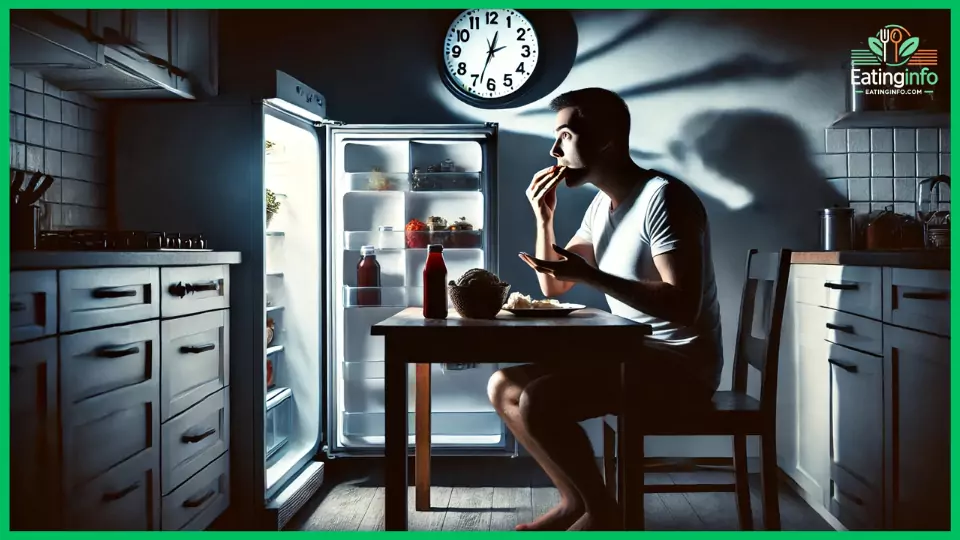Have you ever wondered what would happen if you ate only at night? Due to a busy schedule, personal preference, or simply habit, many find themselves not eating during the day and eating everything at night. While this might seem to be innocuous in the initial stages, the implications for your mind and body can be staggering.
Your natural rhythm, metabolism, hormones, and even your mental well-being are greatly influenced by the timing of when you eat. Eating only at night might be easy, but it can lead to weight gain, digestive issues, poor sleep, and even an increased risk of serious illness.
So what really happens when you eat only at night? Let’s delve into the science of nighttime eating and how it impacts your health.

The Science Behind Eating at Night
Did you ever consider what would happen if you only ate at night? Due to a busy schedule, personal preference, or simply a habit, there are numerous individuals who do not eat during the day and eat everything at night. Although this may seem to be nothing in the start, the consequences for your body and brain can be dramatic.
Your metabolism, body rhythm, hormones, and even your mental well-being are greatly influenced by when you eat. Eating a night diet might be easy, but it can lead to weight gain, constipation, sleep disturbance, and even an increased risk of serious illness.
But what does really happen when you only eat at night? Let’s examine the physiology of eating at night and how it impacts your body.
Weight Gain and Metabolism
Eating at night significantly affects your metabolism, which determines how efficiently your body burns calories.
- Increased fat storage – At night, your body tends to store excess calories instead of burning them for energy.
- Higher risk of obesity – Studies suggest that people who consume most of their daily calories at night are more likely to gain weight.
- Disrupted hunger hormones – Nighttime eating can throw off the balance of ghrelin (hunger hormone) and leptin (fullness hormone), making you feel hungrier throughout the day.
A study published in the journal Obesity found that people who ate most of their calories at night had higher body fat percentages and slower metabolism compared to those who ate earlier in the day.
Impact on Blood Sugar and Insulin Levels
If you frequently eat only at night, your blood sugar levels can spike and crash unpredictably, leading to:
- Increased risk of type 2 diabetes – Late-night eating is linked to insulin resistance, making it harder for your body to regulate blood sugar.
- Higher fasting blood sugar levels – Your body struggles to process glucose efficiently at night, causing blood sugar levels to remain elevated.
- More cravings and energy crashes – Irregular blood sugar levels can leave you feeling exhausted and craving sugary, high-calorie foods.
A study by the American Diabetes Association found that people who ate their biggest meal at night had higher blood sugar levels and a greater risk of developing metabolic disorders.
Digestive Problems and Gut Health
Eating only at night can wreak havoc on your digestive system, leading to:
- Acid reflux and heartburn – Lying down soon after eating can cause stomach acid to flow back into the esophagus.
- Slow digestion – At night, your body’s digestion slows down, increasing the risk of bloating and discomfort.
- Imbalance in gut bacteria – Late-night eating can negatively affect your gut microbiome, leading to digestive issues and poor nutrient absorption.
To avoid these issues, health experts recommend spacing meals evenly throughout the day rather than consuming all your calories at night.
Sleep Disruptions and Poor Rest
Have you ever had a restless night after eating a heavy meal before bed? That’s because eating at night can seriously disrupt your sleep quality. Your body is designed to rest and recover at night—not digest large amounts of food.
When you eat late, your digestive system remains active, preventing your body from fully relaxing. This leads to:
- Difficulty falling asleep – Your body is busy digesting instead of winding down.
- Frequent wake-ups – A full stomach can cause discomfort, acid reflux, or even night sweats.
- Poor-quality sleep – Your body produces less melatonin (the sleep hormone) when food is being digested, making sleep light and unrefreshing.
A study from the Journal of Clinical Sleep Medicine found that people who ate within two hours of bedtime took longer to fall asleep and experienced more disruptions throughout the night. Over time, sleep deprivation leads to low energy, poor concentration, and an increased risk of chronic diseases.
If you’re constantly feeling exhausted despite sleeping for hours, your late-night eating habits might be to blame.
Hormonal Imbalance and Cravings
Your body operates on a delicate hormonal balance, and eating at night throws that balance off completely.
- Increased hunger hormones – Eating at night raises ghrelin (the hunger hormone), making you hungrier throughout the day.
- Disrupted fullness signals – Leptin, the hormone that tells you you’re full, becomes less effective, leading to overeating.
- Higher cortisol levels – Late-night eating can increase cortisol (the stress hormone), which is linked to weight gain, anxiety, and poor sleep.
This hormonal chaos creates a vicious cycle: You eat late → Your hunger hormones get out of sync → You feel hungrier the next day → You eat even later at night → The cycle repeats.
Over time, this can lead to binge eating disorder, food addiction, and a constant battle with cravings.
Mental Health Consequences
Eating at night doesn’t just affect your physical health—it can also take a toll on your mental well-being.
Many people turn to late-night eating as a way to cope with stress, loneliness, or boredom. But instead of feeling satisfied, it often leads to:
- Guilt and shame – Overeating at night can cause feelings of regret and self-judgment.
- Increased anxiety – Unhealthy eating habits can worsen anxiety and stress.
- Higher risk of depression – Studies show that irregular eating patterns are linked to a greater likelihood of developing depression.
If you find yourself eating only at night due to emotional reasons, it might be a sign of emotional eating or a deeper mental health issue. Seeking support from a therapist or nutritionist can help break the cycle.
Effects on Energy Levels and Productivity
Ever wake up feeling sluggish and drained, no matter how much you sleep? Eating at night might be the reason.
When your body spends the night digesting, it doesn’t get a chance to fully recharge. This can lead to:
- Brain fog and difficulty focusing
- Low energy levels throughout the day
- Reduced productivity and motivation
Instead of waking up refreshed, you start the day feeling exhausted and unmotivated. Over time, this affects your work performance, personal life, and overall well-being.
Potential Benefits of Eating at Night (Myth or Truth?)
Some people claim that eating at night boosts metabolism or improves digestion. But is there any truth to this?
- Does fasting during the day improve digestion? – Not necessarily. While intermittent fasting can have health benefits, eating only at night disrupts your body’s natural digestive rhythm.
- Can eating at night help with muscle recovery? – For athletes, a small, protein-rich meal before bed may support muscle repair. But for the average person, nighttime eating does more harm than good.
- Is late-night eating better for shift workers? – If you work night shifts, adjusting your meal schedule to match your wake-sleep cycle can help. However, eating large meals before sleep is still harmful.
For most people, the cons of nighttime eating outweigh the potential benefits.
Who Might Benefit from Eating at Night?
In some cases, eating later in the evening might be necessary or beneficial:
- Shift workers – People who work night shifts may need to adjust their eating schedule, but they should still avoid eating right before sleeping.
- Athletes – Those who train late at night may benefit from a small, protein-rich snack before bed to aid muscle recovery.
- People with medical conditions – Certain conditions, such as hypoglycemia (low blood sugar), may require eating at night to prevent symptoms.
However, even in these cases, timing and food choices matter.
How to Minimize the Risks of Nighttime Eating
If you must eat at night, here’s how to reduce the negative effects:
Choose the right foods – Go for protein, healthy fats, and fiber instead of processed or sugary snacks.
Control portion sizes – Stick to small meals instead of binge eating.
Eat earlier in the evening – Try to eat at least 3 hours before bedtime.
Stay hydrated – Sometimes, thirst is mistaken for hunger.
Listen to your body – If you’re eating at night out of habit rather than hunger, try mindful eating techniques.
Small changes in eating habits can make a huge difference in your overall health.
Breaking the Habit: How to Stop Eating Only at Nigh
If you’re stuck in a pattern of eating only at night, breaking the habit takes time and effort. Here’s how to do it:
🔹 Start with small meals during the day – Even if you’re not hungry, train your body to eat in the morning and afternoon.
🔹 Plan your meals – Create a structured eating schedule to prevent late-night binges.
🔹 Manage stress – Many people eat at night due to stress. Try meditation, exercise, or journaling instead.
🔹 Improve your sleep habits – A solid bedtime routine can help reduce nighttime cravings.
Breaking free from nighttime eating isn’t just about food—it’s about reclaiming your health and well-being.
Expert Opinions and Scientific Studies
Health professionals strongly discourage nighttime eating. According to Dr. Satchin Panda, a leading expert on circadian rhythms, late-night eating disrupts metabolism, increases the risk of obesity, and negatively impacts overall health.
Research published in The American Journal of Clinical Nutrition also confirms that people who eat most of their calories at night are at a higher risk of weight gain, diabetes, and poor sleep.
The key takeaway? Eating during the day aligns with your body’s natural rhythm and promotes better health, energy, and longevity.
Eating only at night might seem harmless, but the impact on your body and mind is serious. From weight gain and sleep issues to hormonal imbalances and mental health struggles, the consequences are far-reaching.
If you’re caught in a cycle of nighttime eating, now is the time to make a change. Start small, be consistent, and remember: your body thrives on balance.
By prioritizing a healthy eating schedule, you’ll wake up feeling refreshed, energized, and ready to take on the day.
FAQs
1. Is it okay to eat only at night if I practice intermittent fasting?
Intermittent fasting can have benefits, but eating all your calories at night can disrupt metabolism and sleep. It’s better to eat earlier in the day.
2. Can eating at night cause weight gain even if I eat healthy foods?
Yes. Your body’s ability to burn calories is lower at night, meaning even healthy foods can be stored as fat if eaten too late.
3. How can I stop eating at night?
Start by introducing small meals earlier in the day, managing stress, and creating a structured eating schedule.
4. Does eating at night always cause digestive problems?
Not always, but large or unhealthy meals at night increase the risk of acid reflux, bloating, and poor digestion.
5. What’s the best time to eat for a healthy metabolism?
Experts recommend eating most of your calories earlier in the day when your metabolism is most active.

